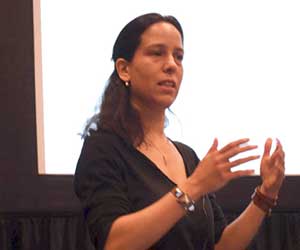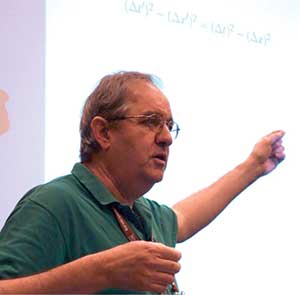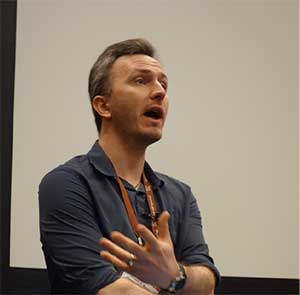The Author in Dialogue: Jimena Canales's The Physicist and the Philosopher: Einstein, Bergson, and the Debate That Changed Our Understanding of Time
By Robert P. Crease, Stony Brook University, Stony Brook, NY
Over 150 people attended the March meeting session devoted to Jimena Canales’s book, The Physicist and the Philosopher: Einstein, Bergson, and the Debate That Changed Our Understanding of Time. It was the second of an annual series of FHP-sponsored sessions in which the author of a recent book on history of physics meets critics and commentators. The 2017 session was held on the third floor of New Orleans’ huge convention center. The atmosphere was relaxed and genial, with the papers and conversation directed, not at professional physicists or professional philosophers, but to those interested in the general subject of the nature of time, and assumed a modest shared knowledge of both physics and philosophy. Canales, from the University of Illinois at Urbana-Champaign, and four other people spoke.
Canales’s book was built around a 1922 episode in which Einstein and Bergson clashed about the nature of time; she discussed both the buildup to and the aftermath of the event, in which physicists and philosophers continued to display a lack of understanding for each others’ position. “The book has been more successful than I ever imagined,” Canales began. Part of the controversy, she continued, was fueled by physicists’ negative attitude towards philosophy, and she cited numerous examples. Then she noted that most if not all physicists have implicit philosophies, but these are so prevalent and taken for granted that they are not usually recognized as philosophical at all. She also pointed to negative reviews of her book, associating a defense of Bergson with postmodernism, fake news, and specious thinking. The value of reviving interest in the controversy, she said, was in reviving discussion of the difference between psychological and philosophical time -- between, say, measuring the length of melodies and being able to hear them as melodies at all.
Jean Bricmont, of the Université catholique de Louvain, spoke next, giving a talk entitled “Bergson vs. Einstein: is there really a philosopher’s time?” His answer seemed to be in the negative. He explained the scientific issues of relativity that he said had led Bergson into error. Relativity, he said, had nothing to do with consciousness, as Bergson seems to have thought, but with clocks. Bricmont declared, though, that physicists could do philosophy a favor by giving up certain ways of speaking that seem to lead philosophers to think that relativity does have to do with consciousness. The take-home lesson of the Bergson-Einstein controversy, he concluded, is that (as Bertrand Russell had warned) to understand the world, we cannot trust our intuitions.
“I am a scientist -- an astrophysicist,” said Adam Frank of the University of Rochester, the third speaker in the session, “and I loved this book.” The reason, he said, was that it highlighted a different dimension to time, what philosophers call “lived time,” than the one that physicists are used to discussing. Bergson, he said, was trying to grasp lived time and distinguish it from the way physicists encounter time. Frank proceeded to describe the approach to time of phenomenologists, who study the conditions for the possibility of any experience altogether -- again, the difference between what is involved in measuring the length of a piece of music and what is involved in hearing it in the first place. It is difficult to describe this to physicists, who are interested in structures and foregrounded objects of research, but it is part of being human and nothing subjective. You have to use a different kind of language to describe it. “I want to turn the usual question on its head,” Frank said. “The usual question is, ‘How do we situate experience within physics?’ I want to change it to, ‘How do we situate physics within the totality/unity of experience?’” Such a question can only be answered by admitting that there is a time that is not the physicist’s time -- not clock time. Frank also noted that one major difficulty to reconciling the physicists’ and the philosophers’ view of time is that the practitioners of each field have an “ontological mania,” regarding themselves as the wardens of the ontological primacy of things like time.
Joseph Martin’s talk was entitled, “What if Bergson Won?” Being a good historian, he immediately apologized, admitting that counterfactual history is out of favor with historians. It’s hard enough, he said, to evaluate statements about what did happen, let alone about what would have happened. It’s also hard even to get a fix on what it would mean for Bergson to win. Still, he thought that the exercise might be a good thought experiment that would give a “different and helpful perspective on the history that we do have,” and in particular on the split between physics and philosophy.
What Martin intended was not that, in envisioning a win by Bergson, it would mean that Bergson’s account would replace accounts of objective time, or that all objections to Bergson’s account would vanish. Rather, the disagreement, he noted, was not really about time itself, but “about who has the authority to speak on behalf of the phenomena.” If Bergson had succeeded in this counterfactual thought experiment, Einstein and his followers would have come to appreciate that clock time was derived from lived time. But we also have to be somewhat charitable to Bergson and imagine that the victory was not entirely complete, but that Bergson ultimately had to realize that he had to stop defending his time as the opposite of clock time, and abandon the rivalry between his views and Einstein’s. If this all happened, Martin was implying, several good things might have occurred.

Jimena Canales of the University of Illinois at Urbana-Champaign




Jean Bricmont of the Université catholique de Louvain (top), Adam Frank of the University of Rochester (2nd from top), Joseph Martin of the University of Cambridge (2nd from bottom) and Alberto Martinez of the University of Texas at Austin (bottom)
First, it would have affirmed the right of philosophers to engage with the physicists in the European intellectual community, and perhaps the American one as well, about the nature of scientific phenomena. This would have meant that “philosophers (even those without positivistic leanings) would have gotten better than Bergson was at responding to the leading edge of theoretical knowledge.” It would have encouraged at least some philosophers to keep up with their technical competence of science enough to carry philosophy of science forward. It would have meant that the philosophical community would have taken philosophy of science more seriously as a mainstream discipline rather than as a specialty best left to technicians or even to scientists who have read a bit of Kant and Popper. Second, Martin said, if that happened, “scientists would have gotten better at communicating those ideas to philosophers, if only to fend off potential philosophical critiques, which would have been important for their own standing.” Furthermore, one might add, it would have meant that physicists would have been more likely to notice and respond to what Bergson and other philosophers were noticing and responding to. A world in which Bergson had won, Martin said, would be “one in which physics doesn’t split quite so abruptly from its natural philosophy roots.” As a result, Martin said, had Bergson “won,” whatever that would mean, it would have encouraged greater communication between the physics and philosophical communities.
The final talk in the session was by Alberto Martinez, who tried to explain Einstein’s allergic reaction to Bergson. Martinez cited a lot of pro and con remarks by Einstein about philosophy, noting that Einstein liked Hume-like clarity, and said that “from the point of view of logic, all of our concepts are freely chosen conventions.” Martinez also listed problems with Bergson’s various remarks about relativity, calling one remark by Bergson about the twin paradox “stunningly inept.” In the question and answer period, Frank objected to that remark, saying that Bergson’s error was not the point. Bergson was pointing out that each twin had its own experience. The point is not to work out the details mathematically, it’s to emphasize the role of lived experience, whose root is different from the functioning of the apparatus. Martinez responded that “Bergson needed more courage,” and was making a straw man out of Einstein.
The articles in this issue represent the views of their authors and are not necessarily those of the Forum or APS.
